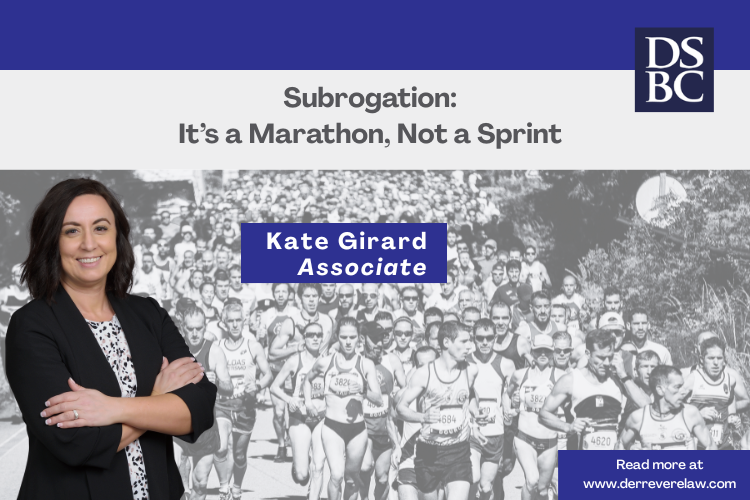Raising Subro: Building Your Subrogation Dream Team

Achieving success in the subrogation field is largely dependent on the team of subrogation professionals and/or attorneys that you assemble. The two simple, yet critical elements to building your subrogation dream team are hiring the right people for the job and raising them to be stars of your team. Every employer has different criteria that they use to help determine the best employee to hire. Most will focus on pedigree and experience in the subrogation field. Employers feel more comfortable hiring an employee who has previously worked in subrogation as they feel they will most likely be easier to train and start producing results sooner. However, if you hire the right kind of employee and have an established training program for your subrogation team, prior subrogation experience is not necessarily a requirement.
The three essential traits of a great subrogation hire are someone who is trainable, has a compatible personality, and is a team player. Determining if a potential hire is trainable is key to their long-term success on your team. Whether it’s a 20-year seasoned veteran of the subrogation industry or a green adjuster/attorney that has no clue as to what subrogation means (outside of their quick Google search of the term in preparation for their interview), finding someone who has the willingness to learn is highly important. Teaching a new subrogation hire takes time and requires the new employee to have the patience to start from the basics and gradually learn the process. If the new hire is unwilling to learn your group’s subrogation process and listen to constructive criticism of their supervisors, then this can
substantially hurt the chances of the employee becoming an effective member of the team.
Hiring an employee with a compatible personality is one of the most important attributes but is probably the most difficult to attain. Your current team’s culture will determine which type of personality you are looking for. You want a new team member that will fit in with your current group and bring something new to the table. For example, our subrogation group at DSBC consists of a diverse set of personalities and people but the common theme is being a “good” person and team player. We spend so much time with our work family that you want to enjoy who you are spending your time with. This starts with people who prioritize respect. All members of the team are required to treat each other with respect. Whether senior management or a new intern, all teammates must respect one another. Here at DSBC, we also adhere to the work hard/play hard mentality. Hitting your recovery goals takes an immense amount of grinding and effort throughout the year. However, there is no reason why your team cannot have fun while working through the grind. Find team members that have enthusiasm, charisma, and are enjoyable to work with. If your new employee’s personality fits in with your team, then you are more likely to avoid unnecessary office drama and they will improve your team’s work environment.
The last essential trait for a new member of the team is being a team player. Hitting your subrogation recovery goals takes a village. Every member of your team needs to be invested in helping, however possible, to achieve your goals. Whenever an issue/challenge arises, all team members need to be ready and willing to assist. If team members are solely focused on their own recovery numbers, then it can hurt your team’s morale and your ability to achieve the group’s recovery goal. Being a good team player also involves checking your ego at the door and being willing to assist in any task whether it’s big or small. When selecting your new employee, focus on whether they are going to be a willing helper regardless of the task.
The last step to building your subrogation dream team is building an established training system to put your new hires in the best position to succeed. First and foremost, having supervisors and senior members of the group spend time with the new employees is essential to your training system. Your senior members of the team are your best assets in training your new teammates. This obviously requires your senior members to be willing to commit some of their work time to training but the eventual rewards are more than worth it. One of the best tools for training is observation. Trainees learn best when they can observe other members of the team while they are handling their daily duties. Whether its new attorneys shadowing senior attorneys in depositions, mediations, and hearings or subrogation professionals bringing new hires onto their phone calls to observe, this type of experience is essential in training your new employee and also showing them the culture of your group. Another key training tool is making all members of your team accessible to the new employees for questions. The different members of the team can pass on different lessons and strategies to help the new teammate build their own work routine. Making sure that you have an open-door policy for the new employees is extremely helpful in ensuring they feel comfortable enough to ask questions. Lastly, empowering your new employees is key to them becoming self-sufficient and effective members of your team. Constructive criticism is part of any good training system but building up your new employee’s confidence is important as well. When mistakes are made by a new employee, it is important to focus on finding a solution and using the experience as a teachable moment for them. When new team members accomplish tasks, make sure the senior members of the team take time to show praise as well. Instilling confidence in your new employees will help produce more competent and self-sufficient members of your team.
Building your dream subrogation team is a combination of finding the right teammates and providing them the proper training to succeed. While prior experience in the subrogation field is certainly helpful, it does not need to be a prerequisite to hiring a new member of your subrogation team. As long as you prioritize the compatible personality traits that fit your group in the hiring process and develop an effective training system, you can continue to grow and strengthen your subrogation team.




